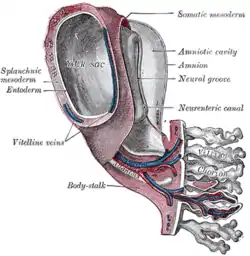Vitelline arteries
The vitelline arteries are the arterial counterpart to the vitelline veins. Like the veins, they play an important role in the vitelline circulation of blood to and from the yolk sac of a fetus. They are a branch of the dorsal aorta.
| Vitelline arteries | |
|---|---|
 Model of human embryo 1.3 mm. long. (Vitelline arteries not shown, but vitelline veins labeled at center left.) | |
| Details | |
| Carnegie stage | 13 |
| Days | 28 |
| Identifiers | |
| Latin | Arteria vitellina |
| Anatomical terminology | |
They give rise to the celiac artery, superior mesenteric artery, and inferior mesenteric artery.[1]
References
External links
- cardev-009—Embryo Images at University of North Carolina
- https://web.archive.org/web/20070623132305/http://isc.temple.edu/marino/embryology/Heart98/heart_text.htm
- Embryology at Temple Heart98/heart97a/sld021
- https://web.archive.org/web/20070915072304/http://www.ana.ed.ac.uk/database/humat/notes/extraemb/yolksac/vitart.htm
- http://www.med.umich.edu/lrc/coursepages/M1/embryology/embryo/13cardiovascular_system.htm
- https://web.archive.org/web/20070812190309/http://www.med.mun.ca/anatomyts/embryo/emb6.htm
This article is issued from Wikipedia. The text is licensed under Creative Commons - Attribution - Sharealike. Additional terms may apply for the media files.